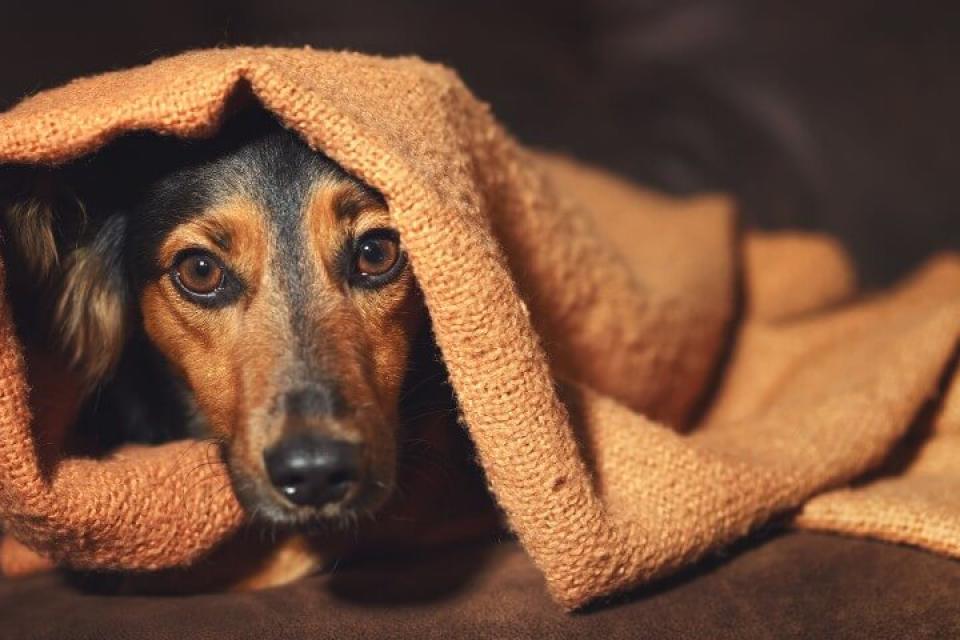Routine and learning games can help your pet through the crisis. As coronavirus forces us to isolate, some pundits are suggesting now is the ideal time to bring a dog into your life.
But experts say you need to think first before taking on a puppy.
Staying home and not socialising your dogs, most notably puppies, risks them of becoming afraid of unfamiliar people and other dogs. This, combined with being in an urban environment for a long time, relative inactivity, and sub-optimal training activities, could set up a COVID-19 generation of dogs who aren’t equipped for urban and suburban living. And considering the biggest killer of dogs under three years old is behavioural euthanasia, it’s important to take steps to enrich your dog’s environment.
But first, let’s discuss our own behaviour around dogs.
Keep good hygiene around pets
COVID-19 spreads from human to human and, to date, there is no evidence that companion animals spread the disease.
That said, it’s best to touch only your own dog over the next few months and not allow others to cuddle your puppy or dog.
The World Organisation of Animal Health says:
When handling and caring for animals, basic hygiene measures should always be implemented. This includes hand washing before and after being around or handling animals, their food, or supplies, as well as avoiding kissing, licking or sharing food.
When possible, people who are sick or under medical attention for COVID-19 should avoid close contact with their pets and have another member of their household care for their animals. If they must look after their pet, they should maintain good hygiene practices and wear a face mask if possible.
Social isolation for social animals
If you’re suddenly working from home a lot or in lockdown, your dog is probably over the moon. Dogs thrive on contact with members of their social group. So, it might be hard to get work done with your dog vying for your attention.
Encourage your dog to settle with items to lick and chew, such as pigs’ ears and food-dispensing toys, but avoid giving these items in response to being pestered. Break up the day with smaller, more frequent meals and regular toilet breaks.

Give dogs chew toys to help them settle down. Photo: Pixabay.
Many dogs are accustomed to receiving daily exercise and having much of their social needs met through play with other dogs in public areas. If this is no longer an option, you may find your dog is unusually active and mischievous at home.
Now may be the time to create structure such as “play” and “quiet time” cues so your pets don’t learn to demand your attention at any time.
Puppy socialisation
Puppies’ social needs are the greatest of all. It’s critical for vaccinated puppies to be socialised with lots of different people, dogs and environments. But under social isolation, finding opportunities for these encounters may be difficult.
It’s safe for dogs to play with other dogs. So, if you go for a walk with your dogs, and they see another dog, they can be allowed to greet each other, but their contact with other humans should not be encouraged. The same principle applies to dog parks and play dates.

It’s safe for dogs to play with other dogs, just make sure humans keep their distance from other humans. Photo: Pixabay.
For puppies, looking at objects is the next best thing to touching them, and they can learn about their environment through short excursions to see traffic, pedestrians and other dogs.
From within a vehicle, puppies can observe traffic and other animals. And from the safety of their own home, they can and should be gradually exposed to various recorded sounds, such as thunder, babies crying and vacuum cleaners.
Play learning games
With the shutdown of social gatherings, pups will inevitably miss out on important socialisation opportunities. This may create the need for extra training when life returns to normal.
But while dog-training businesses may be reducing their services, many are offering online courses and training challenges through social media to help people stay engaged and on top of their dog’s training.
Canine challenges includes scent games, which are great enrichment for dogs. Dogs are experts at sniffing out objects, and practising these skills with toys in the yard or on the balcony gives them an outlet for these natural abilities (and it can be lots of fun for the humans too).
You’d be amazed how good they are at tracking your scent, even indoors. With the right food or toy rewards, playing hide and seek with your dog is also an opportunity to reinforce an excellent recall.

Dogs need to learn that separation from their owner is normal. Photo: Pixabay.
What happens if we stop working from home?
Dogs like to be with their social group at all times, and they may come to expect they’ll always be involved.
Recent research into separation-related distress (SRD) suggests this is a very complicated phenomenon with multiple possible causes. Hyper-attachment to owners and panic when left alone aren’t the only reason dogs can develop SRD. Frustration, noise sensitivity and other anxieties may also exacerbate SRD.
For puppies growing up in the COVID-19 era of free access to human owners, it’s particularly important for them to learn that separation from their owners is normal and non-threatening.
If you’ve got a new puppy or an at-risk dog such as those with a history of anxiety, make an effort to separate them for short periods. This may be another good reason to create a work routine while working from home: time for exercise, time for food, time for games and time to work without interruptions.

Dogs keep us active and fit. Photo: Pixabay
Stay active and engaged
Our canine friends may give us reasons to stay physically active while many of our usual activities have been cancelled, and they may provide comfort to us in this time of social isolation.
By keeping up with environmental enrichment, you can make sure your four-legged best friend doesn’t suffer from cabin fever. If you have a puppy or are bringing home a new dog, plan how to set them up for life post-COVID-19.
This article was written by Dr Melissa Starling, Professor Jacqueline Norris and Professor Paul McGreevy from the Sydney School of Veterinary Science. It was first published on The Conversation under a Creative Commons license. Read the original article.













